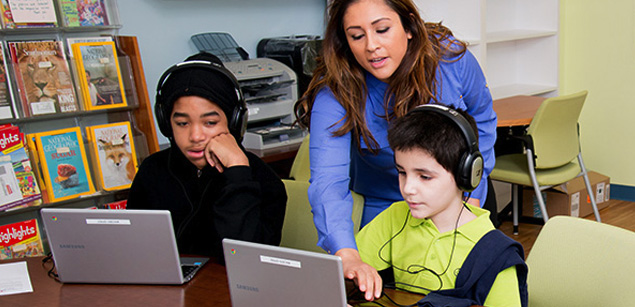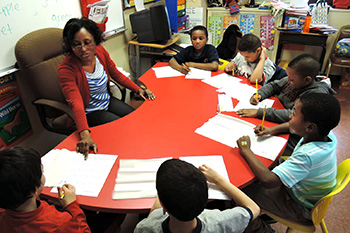
“Tell me and I’ll forget; show me and I may remember; involve me and I’ll understand.”
Full and robust curriculum modified to accommodate individual student needs
We provide a full and robust school curriculum that is aligned with New Jersey Core Curriculum Content Standards (NJCCCS), yet accommodate individual students who have special needs. We manage this important balance in several ways. Combining academic instruction with a school-wide social skills training program, emotional/behaviorial counseling and small classroom settings allow our teachers to provide individual support for each student. Instructional lessons are taught in smaller “bites” over a longer period of time. As a result, students can fill in gaps in their education and learn at a more reasonable pace.
Creating Lifelong Readers and Learners
Our ultimate goal at Westbridge Academy is to help our students love reading and use it to become lifelong learners. Reading support and skill building are integral parts of the curriculum in both Elementary School and High School. Our reading program includes Orton-Gillingham instruction when needed. Orton-Gillingham is an explicit, sequential, systematic, and multi-sensory approach for teaching literacy. The evidence-based program breaks reading and writing into smaller skills involving letters and sounds, then builds on these skills over time. As our students progress they are exposed to a more comprehensive language arts program that includes writing and critical thinking.
Westbridge Academy’s new Reading Lab was designed by our own Reading Specialist and Speech & Language Therapist to provide a richly collaborative environment in which to provide more intensive and integrated reading and language supports for our students.
Student Passport provides a complete picture of student performance
 While a letter grade in math or science is useful for understanding a student’s level of knowledge relative to other students, letter grades cannot capture a student’s sense of self or well-being, their desire to learn, or their emotional and social challenges, which are so critical to success in school. This is why Westbridge Academy has developed the Student Passport, a comprehensive approach to assess students, which is used by instructional and support staff, including teachers, social workers, parents and representatives from the school district.
While a letter grade in math or science is useful for understanding a student’s level of knowledge relative to other students, letter grades cannot capture a student’s sense of self or well-being, their desire to learn, or their emotional and social challenges, which are so critical to success in school. This is why Westbridge Academy has developed the Student Passport, a comprehensive approach to assess students, which is used by instructional and support staff, including teachers, social workers, parents and representatives from the school district.
The Student Passport includes ten sections that provide a comprehensive assessment of the student’s progress and emotional make-up, including:
- Learning styles
- Interests
- Behavioral progress and goals
- State testing results
- Disciplinary issues and remediation
- Academic progress
- Samples of student work
If a report card is a snapshot, the Student Passport is more like a movie that includes the “hows and whys.” Because the Student Passport is useful for showing the school districts how the child has improved, it plays a crucial role in IEP (Individualized Education Plans) meetings in which robust and timely information can help shape a successful path for the student.



